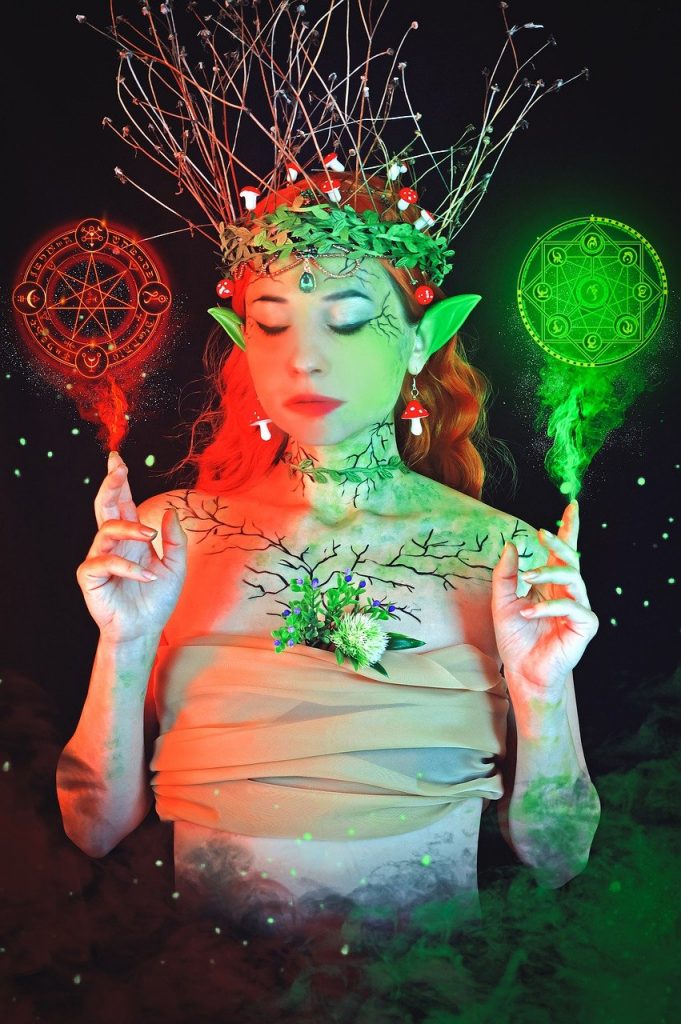Druidic Ethos

Celtic Druids and the Tuatha de Dannan
By Dominique Crouzet
Knowledge: A much important thing to consider is that in the Celtic society there is no difference between science and religion. Both belong to the same thing. As such, science (as we would see it today) is explained in religious terms and seen as sacred. Then, in a world where magic and the gods are real, science and knowledge comes from the gods; hence, trying to learn about the universe is also trying to commune with the gods and acquire divine abilities (reflected by the magic wielded by the druids). Note by the way that science is not only intellectual and rationale, but also intuitive and magical. Thus, since science and religion go together, Celtic druids may be seen as being both priests and scientists. In fact, the druids combine natural studies, poetry, astronomy, religion and other disciplines to form groups of experts from each field, thus enhancing the picture of the universe to be studied as a whole. The whole point is that Druidism is to know about the laws which govern all things, so people may live harmoniously in the world and so prevent disasters to fall upon them.
The Truth: Otherwise, another important aspect of druidism is the value put on truth. “Righteousness of Truth” druids are thus expected to always say the truth (on important matters where their advice is sought), and not doing it may have terrible effects on them, resulting in a loss of powers. Note that a druid who doesn’t want to answer may ask for the price he is entitled to for his advice (which may be quite high at higher levels), and which may be beyond those asking possibility.
Deity Worship: The druids revere the Celtic gods (that is: the Tuatha de Dannan) as a whole. As such, no deity has a specific church or priesthood as for traditional pantheons. Instead, some druids (specifically: the filidh) choose a deity to act as their spiritual guide and source religious inspiration. However, the druid doesn’t worship the god as a creator deity; and there is also no rivalry or enmity between druids having different patron gods.
The Celts worship the forces of nature and do not envisage deities in anthropomorphic terms. Deities undoubtedly form a background to everyday life. Ritual practice in Celtic societies lack a clear distinction between the sacred and profane in which rituals, offerings and correct behaviour maintained a balance between gods and man, and harnessed supernatural forces for the benefit of the group.
Celts perceive the presence of the supernatural as integral to their world. The sky, the sun, the dark places underground all have their spirits, life-forces and personalities. Every mountain, river, spring, marsh, tree and rocky outcrop is endowed with divinity. Celtic society is predominantly rural. The close link enjoyed with the natural world is reflected, the spirits worshipped are those of both the wild and cultivated landscapes and their inhabitants. Cults focus upon features of the landscape; mountains, forests and animals. Divine powers associated with the fertility of humans, of livestock and of crops are objects of veneration. Tribal territories were themselves held sacred and the ground and waters which received the dead were imbued with sanctity and revered by their living relatives. Sanctuaries are sacred spaces separated from the ordinary world, often in natural locations such as springs, groves or lakes.
Many topographical features are deified as homes of gods: many divine names refer to specific locations or geographical features, a clear indication of how closely Celtic societies identify with place. Small thank offerings were placed in domestic storage pits while more elaborate deposits were left in specially dug ritual shafts and in lakes. These offerings linked the donor to the place in a concrete way, since complex and varied rituals involved the individual in personal contact with the sacred sites devoted to their gods. An image very different from the idea of druids administering a pan-Celtic religion.

 Buy me a coffee
Buy me a coffee